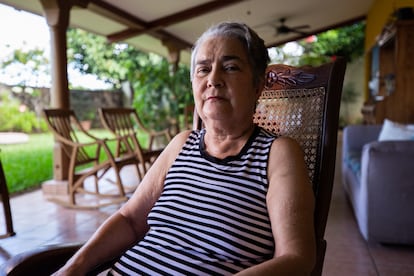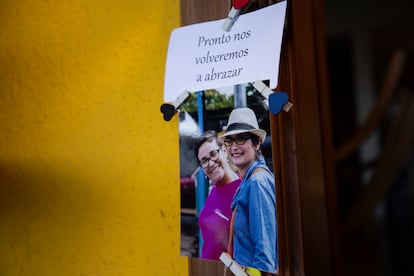Pinita Gurdián, Nicaragua’s heartbroken matriarch who died before she could say goodbye to her exiled family
In 2021, the Sandinista government seized her passport, blocking her from seeking cancer treatment abroad. Despite her illness, she continued to demand the release of her family members


Josefina Gurdián, also known as Doña Pinita, faced a difficult medical prognosis. She had been fighting aggressive, metastasized cancer and an ileostomy (similar to a colostomy) that greatly affected her health since November 2021. There was a time when she required intubation and was on the verge of death. Despite the bleak predictions, she defied the odds and was discharged from the hospital. Throughout her ordeal, she doggedly fought for the release of her daughter, Ana Margarita Vijil, and granddaughter, Tamara Dávila, political prisoners of the Nicaraguan regime headed by Daniel Ortega and Rosario Murillo.
Despite her frail health, Doña Pinita went to El Chipote prison for every family visit allowed by the regime. She fainted during one visit and subjected to a strip search on another. Meanwhile, she tirelessly made public statements and worked with human rights organizations to publicize her cause. Doña Pinita’s relentless denunciations soon led to reprisals by the Sandinista government, and in September 2021, they confiscated her passport and barred her from leaving Nicaragua. All this exacted a toll, says her family, and led to her death on August 27 at the age of 79.
Ha muerto en Nicaragua Pinita Gurdián, quien hizo de su vida un modelo de conducta ética y de compromiso con la libertad, la justicia y la democracia desde su fe cristiana. Impedida de salir del país no pudo ver ya a su hija Ana Margarita, despatriada y desterrada, ni a su nieta… pic.twitter.com/QaSWz4j8xJ
— Sergio Ramírez (@sergioramirezm) August 28, 2023
Doña Pinita’s death shocked Nicaragua, where she was a well-known culinary entrepreneur who edited recipe books and hosted a TV cooking show. Doña Pinita had beaten cancer once with chemotherapy, but in 2021 it resurfaced in the peritoneum. She traveled to Chicago for a PET/CT scan (positron emission tomography/computed tomography) that was unavailable in Nicaragua. The test results were inconclusive, so the doctor told her to return in three months for another scan. Then, Doña Pinita’s daughter and granddaughter were arrested and prosecuted for the political crimes of “conspiracy to undermine national integrity” and “conspiracy.”
The arrests of Ana Margarita and Tamara were devastating for Doña Pinita. She remained committed to her beliefs of social justice, which emerged during her youth when she actively supported the Sandinista revolution. She persistently spoke out against the unjust acts targeting her family members. Tamara endured severe treatment as a political prisoner in El Chipote. She was isolated and cut off from all communication from June 2021 to February 2023, when the Sandinista government exiled 222 political prisoners. “It’s the absolute worst thing that’s ever happened to me, even worse than my illness,” said Doña Pinita after her daughter and granddaughter had been in prison for six months.
Doña Pinita promptly returned from Chicago to Nicaragua when learned of their arrest. Three months later, in September 2021, she attempted to travel to Costa Rica, the sole Central American country equipped with PET/CT scan technology. That’s when her passport was confiscated and she was barred from leaving the country.
“In Nicaragua, they did all the tests they could, but this peculiar type of cancer didn’t show up. She really needed that specialized test to save her life. In November [2021], she literally escaped death — they had to intubate and hook her up to a ventilator, and then she underwent a risky operation,” said Josefina Vijil, another of Doña Pinita’s daughters. “After the operation, my mom was even weaker, and it turns out she developed a new cancer that could have been caught earlier if they had done the PET/CT scan. But the medical team in Nicaragua was professional in every sense of the word — not just scientifically and technically — they also showed a lot of compassion.”
Doña Pinita was never able to see her liberated family
Doña Pinita’s health did not improve. Despite multiple relapses, she persisted in her efforts to demand the release of Ana Margarita and Tamara. She visited El Chipote and various government ministries to request her passport, but was repeatedly denied permission to leave the country for medical care in Costa Rica.
On February 9, 2023, Doña Pinita received some joyful news, another incentive to keep fighting for her life. Tamara and Ana Margarita had been released and exiled to the United States. Now all she wanted was to hug her liberated family and say goodbye.

Regrettably, it was not meant to be. Doña Pinita died in Managua on August 27. Her large family grieved her passing from afar. “My mom felt like she was losing strength every day. She really wanted to go and hug Ana Margarita and Tamara, but they just wouldn’t let her. They wouldn’t give her back her passport. It’s a terrible thing they do to people,” said Josefina. “Losing her is really painful because we didn’t get a chance to say goodbye. But you know, the girls are following her lead — she was an incredible woman who had three great loves: my dad, her family and Nicaragua.”
Doña Pinita married Miguel Ernesto Vijil, who became Minister of Housing in the 1980s. She fostered a close-knit clan rooted in the ideals of freedom, social justice and the liberation theology championed by Father Fernando Cardenal. These very principles, which led to her daughter and granddaughter’s imprisonment, were cherished and upheld by this remarkable woman until her last breath. In her last will and testament, Doña Pinita writes, “The essence that defines my legacy is compassion. However, this compassion goes beyond mere pity. It means placing myself in the shoes of others, treating them as I would like to be treated. It entails going above and beyond to alleviate their pain and sadness. I refuse to turn a blind eye like the Jewish priest and the Levite did to the wounded man on the road. Instead, I strive to emulate the Good Samaritan, moved by compassion, stopping to help the man and take him to a place where he would be cared for. And he did even more — he left money to cover the expenses of caring for the wounded man. This is the legacy I wish to leave — unwavering compassion, despite my flaws. Be compassionate.” She was laid to rest in her hometown of León, a city in western Nicaragua. Sadly, six of her relatives were unable to attend as they were denied entry into the country.
Sign up for our weekly newsletter to get more English-language news coverage from EL PAÍS USA Edition
Tu suscripción se está usando en otro dispositivo
¿Quieres añadir otro usuario a tu suscripción?
Si continúas leyendo en este dispositivo, no se podrá leer en el otro.
FlechaTu suscripción se está usando en otro dispositivo y solo puedes acceder a EL PAÍS desde un dispositivo a la vez.
Si quieres compartir tu cuenta, cambia tu suscripción a la modalidad Premium, así podrás añadir otro usuario. Cada uno accederá con su propia cuenta de email, lo que os permitirá personalizar vuestra experiencia en EL PAÍS.
¿Tienes una suscripción de empresa? Accede aquí para contratar más cuentas.
En el caso de no saber quién está usando tu cuenta, te recomendamos cambiar tu contraseña aquí.
Si decides continuar compartiendo tu cuenta, este mensaje se mostrará en tu dispositivo y en el de la otra persona que está usando tu cuenta de forma indefinida, afectando a tu experiencia de lectura. Puedes consultar aquí los términos y condiciones de la suscripción digital.








































